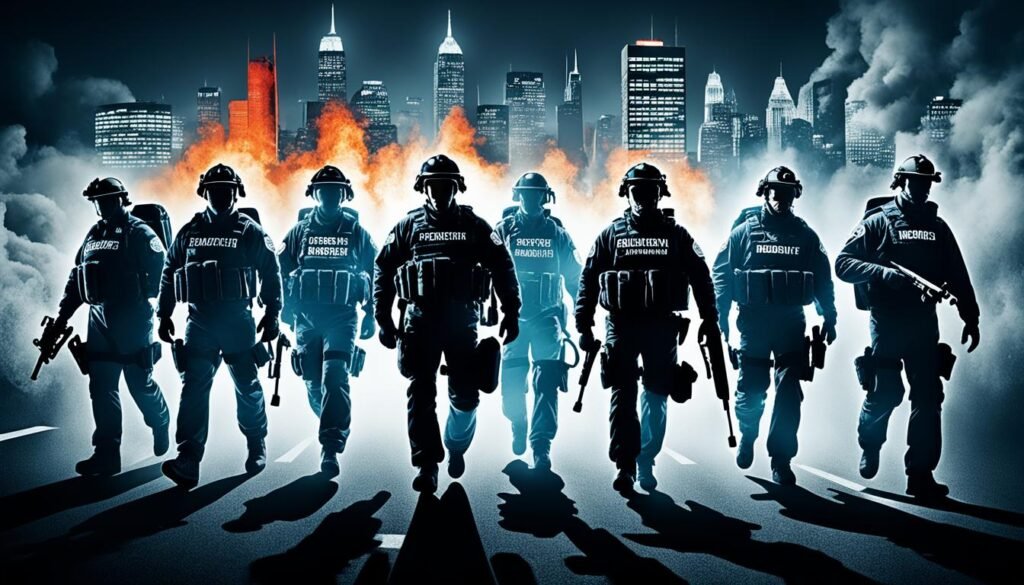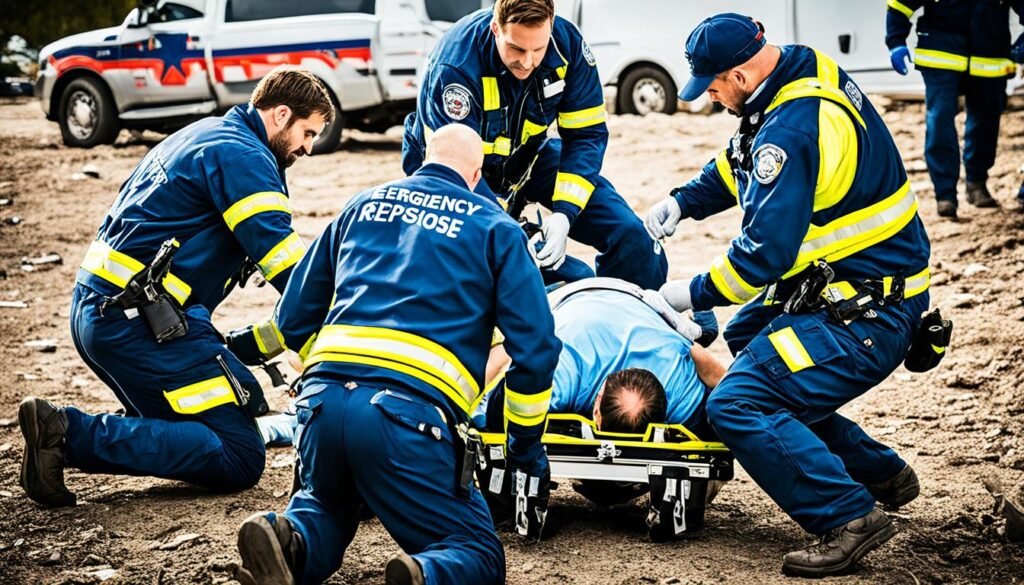An emergency response team is key in dealing with crises effectively. They coordinate and put the emergency plan into action. Whataburger, a food service lchain, stresses the need for such teams to handle emergencies well. Surprisingly, only 3% of companies have someone in charge of crisis management full-time. This fact shows how crucial it is to set up a team with clear roles and duties.
Creating an emergency team means looking closely at what the company needs. Factors like size, industry, location, and potential threats matter. The team should pull together experts from areas like operations, safety, and medical services. Important roles include the incident commander and the safety officer. Teams must train regularly and know the emergency plan well. Working with local emergency services boosts their ability to respond.
Key Takeaways:
- An emergency response team is vital for effectively responding to emergencies.
- Only 3% of businesses employ a full-time crisis management leader.
- Establishing an emergency response team requires careful consideration of the organization’s needs.
- Key roles within an emergency response team include the incident commander, communication coordinator, safety officer, medical first responder, evacuation coordinator, operations manager, and documentation specialist.
- Regular training, preparedness, and collaboration are essential for an effective emergency response.
The Basics of Emergency Team Building
An emergency response team, also known as an ERT or incident response team, is crucial for a company’s emergency plan. This team is small but includes people from different departments. They handle crisis mitigation, safety assurance, business continuity, and disaster recovery.
The specific roles within the team depend on the emergency type. The team’s size and makeup reflect the organization’s size, industry, and potential threats. Team leaders ensure smooth coordination and communication.
“The most successful emergency response teams are those that are meticulously prepared, with each member having a clear understanding of their role and responsibilities. Their coordination and collaboration are crucial in effectively managing emergencies and minimizing their impact on the organization.”
Creating a detailed emergency response plan is key. A specific template ensures no important detail is missed. This includes emergency procedures, communication plans, evacuation routes, and how to keep the supply chain going. Regular drills keep the team ready for anything unexpected.
The 7 Most Common Emergency Response Team Roles
In an emergency response team, some roles are key to the success of the response. People with special skills work in these roles. They help manage crises well. Let’s look at the roles closely:
1. Incident Commander
The incident commander leads the emergency operation. They handle the strategy, coordination, and resources. Their main job is to make sure the response is unified and works well.
2. Communication Coordinator
The communication coordinator is crucial for good team talk. They also talk to outside groups and people involved. Their job is to share news, updates, and instructions to help the team work flawlessly.
3. Safety Officer
The safety officer looks at and handles dangers in emergencies. They apply safety rules, check for risks, and keep everyone safe.
4. Medical First Responder
A medical first responder gives first help to the injured in emergencies. They check injuries, help patients, and work with doctors for more help or to move patients if needed.
5. Evacuation Coordinator
The evacuation coordinator creates plans for fast leaving during crises. They make sure leaving is smooth and help those who need it.
6. Operations Manager
The operations manager takes care of the emergency’s logistical side. They sort out resources, handle gear, and make sure everything runs well. Their work is vital for an efficient response.
7. Documentation Specialist
The documentation specialist keeps track of the emergency response. They note down what happens, actions taken, and what was learned. These notes are important for looking back, improving plans, and following rules.
Every role is vital for an emergency team’s win. With the right people in these spots, groups can lower risks, save lives, and reduce crisis impacts.

Conclusion
Creating a strong emergency response team is key for your business’s safety and survival during a crisis. It’s about having people ready to handle emergencies well. This means quick recovery and less risk.
Key members like the incident commander and operations manager are critical. They each bring skills needed for effective emergency handling. Together, they make your response better.
Train regularly and work with other organizations to improve. Good communication helps too. Using plans and checklists can make your emergency actions strong and reliable. These steps keep you ready and in line with the emergency response best practices.
Speed matters in emergencies. With the right plans and fast actions, you’ll manage crises better. This protects your operations and the people who matter to your business.


